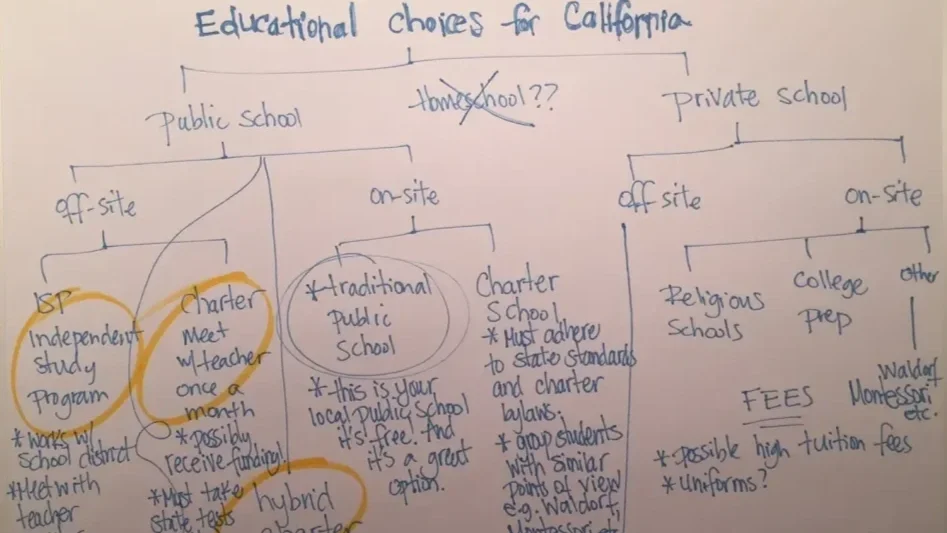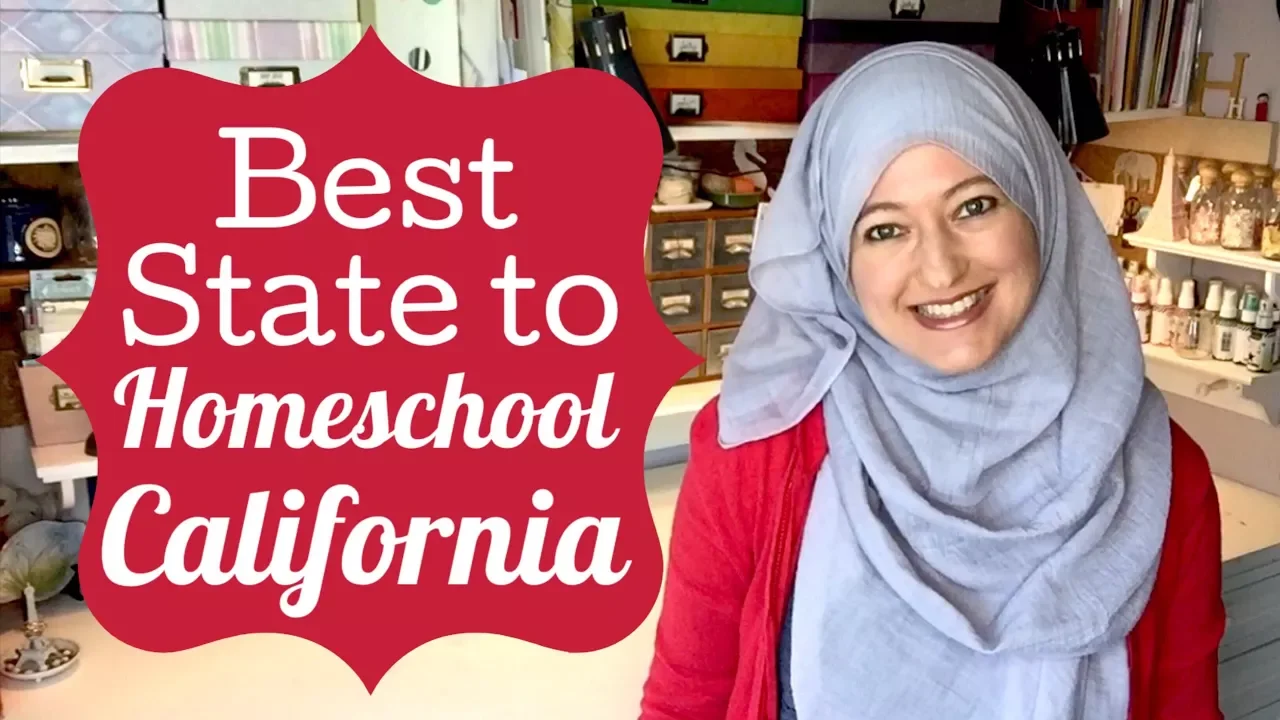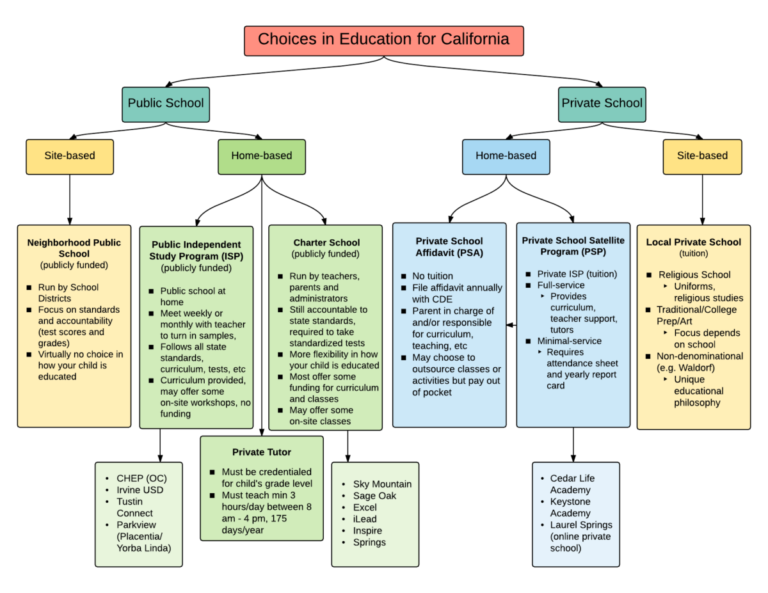The Legality of Homeschool
Our Charter School Experience
Did you know it’s legal to homeschool in all 50 states in the United States of America? Each state has its own laws for homeschooling, so it’s imperative that you understand your state’s unique laws. Some states require extensive paperwork while other states require a minimal amount. Some states offer funding for homeschooling while other states do not. Truancy is a serious offensive so you cannot simply withdrawal your child from public school to homeschool without filing the proper paperwork. In the state of California, you may homeschool through the public or private school route. Using a charter school in some states affords you perks like funding or classes. Whatever you choose, know that as of 2025, it is legal to homeschool in every state. You may check the Homeschool Legal Defense Association (HSLDA) for the laws and your rights in your state.
Homeschooling Legality & Charter School
-

School Options for California
Did you know there is no legal option to homeschool in California! Shocked? Are you wondering how it is that so many families legally and safely homeschool in California? Read on to find out what the legal options are for education in the state of California.
-

Best State to Homeschool | California
Want to know the best state to homeschool in? I stand behind California's options for homeschoolers specifically and schooling in general. Though there isn't specifically a homeschooling option, there are many ways for families to homeschool legally in California.
-

Homeschooling with a Charter School | My Experience
Homeschooling in California has its perks! We are homeschooling using the charter school program. In California, you can homeschool through the private school system or through the public school system. When you homeschool through the private school, you pay money for supplies and services, but when you homeschool through the public school system, you get supplies, services and sometimes funding!
-

California Charter School Experience
What's the biggest perk of going through a charter school that caters to homeschoolers: Funding! Educational funding varies from school to school, but if you are with a school that has no brick and mortar facility, you can expect anywhere from $1000-$3000 per school aged child per year.
School Options for California
Did you know there is no legal option to homeschool in California! Shocked? Are you wondering how it is that so many families legally and safely homeschool in California? Read on to find out what the legal options are for education in the state of California.
First, there are only two school options for California: Public school and private school.
Under both public and private school are ‘on-site’ and ‘off-site’ options. This means you can attend a brick and mortar school under both options. But, you can also be enrolled in an in an ‘off-site’ option for both.
Let’s break it down by starting with public school.
The most common type of school option in California is ‘on-site’ public school. It’s free, local, effective and safe. It’s usually just down the street and there are many perks to this option. It’s your local public school! Local public schools are funded by the state. The perks are that these schools are free and your kids are taught by certified credentialed teachers. The conveyor-belt system of education has been around for over a hundred years and overall has raised the literacy rate in this country to the highest point it has ever been! Educators continually gather together to improve education and graduation rates.
But suppose the on-site model of education doesn’t work for you. For a number of reasons (illness, bullying, talent, giftedness, travel, young professional), a student may not be able to attend school regularly and may need to find another option. The ISP option (Independent Study Program) may be the perfect fit. ISPs are run by the school or school district. You receive all the books and material you would normally get if you were going to school, except you don’t have to attend school. You can work on your school assignments from home or anywhere else. Parents teach their children, but they are overseen by a credentialed teacher. They meet often (typically once a month) to turn in samples of their school work.
Want more freedom? Consider a charter school. Charter schools can be on-site, off-site or hybrid. Each charter school has its own flavor, catering to a unique set of students. The on-site charter schools may be particularly inclined to one educational philosophy or another. The perks are that charter schools are that they are free and usually provide a unique educational experience. They still are funded by the state and are obligated to follow state standards and are not allowed to teach any religious curriculum.
Want more flexibility? Try a hybrid school. These are also charter schools and they offer both on-site and off-site education in the form of classes at a facility 2-4 days a week, while the rest of the instruction is done at home. These schools are also state funded and have to follow the rules mentioned above.
Still want more flexibility and freedom? Try and off-site charter school that provides instruction funding for curriculum and classes. These types of schools are gaining in popularity because families are allocated a certain amount of money to buy educational material pre-approved by the school. The perks are greater freedom of choice when it comes to curricula, however, students are still required to meet state standards and take state and school tests. Students are taught at home by parents or by hired tutors, but they still meet monthly to turn in samples of their work to a credentialed teacher who oversees their work.
Do you have a teaching credential and want to teach your own kids? You can choose the Private Tutorial Program. This only works for the grades you are credentialed to teach. If you have a multi-subject credential, you can teach your kids through 8th grade. If you have a single-subject credential, you can teach that particular subject to your high school student.
Want this option but you are not a credentialed teacher? Don’t worry. You can hire a tutor to teach your kids under the Private Tutorial Program.
Not enough freedom yet? Still want more flexibility and freedom? Maybe a private school option is what your are looking for?
In the private school option, you still have on-site and off-site educational options.
Let’s start with on-site options. These schools include religious private schools, college prep schools and other private schools like Montessori and Waldorf. The perks of these schools are that they are highly specialized in a particular educational method or they include religion which cannot be taught in public schools. Another perk is that all the education is taken care of by the school and teachers. The biggest downside is usually the cost. Tuition fees for private schools can be very steep.
Looking for a cheaper private school option? Try a PSP. In the Private School Satellite Program, you can choose from high-end full-service private schools that will provide a tutor and all the material you need in order for you child to be educated. This is a great option for child actors and other young professionals. The parent doesn’t need to teach his or her child, the PSP will take care of everything if that is the kind of school you chose.
Doesn’t sound like a cheaper option? It’s possible that full-service PSPs can be more expensive that on-site private schools. But, a PSP can also be an affordable option if the school does not provide so many services. You can find PSPs that offer minimal services, such as only filing paperwork for your family, so you can school your child however you’d like. These kind of schools are very affordable costing less than a few hundred dollars a year. But they provide no curriculum and (perk) no oversight.
Want an even cheaper option? How about you file your own paperwork and become your own school?! Yes, you can become your own school by filing your own PSA. A Private School Affidavit turns you into a teacher/administrator and your child into a student! It’s free and you have no oversight from the state other than filing an attendance sheet and report card. You have to file your paperwork yearly for students 6 years to 18 years. The perks are absolute freedom of choice in education!
Want to download a visual copy of this blog post? Click here.
The following chart is a revision made by Saadia. Much thanks goes to her for taking my original chart and making it user-friendly and color coded!
Best State to Homeschool | California
Want to know the best state to homeschool in? I stand behind California's options for homeschoolers specifically and schooling in general. Though there isn't specifically a homeschooling option, there are many ways for families to homeschool legally in California. In fact, I think because there isn't a specific category for homeschooling, it actually allows for greater choice and options. In California, there is the public school option and the private school option. That's it. So you may wonder how homeschooling fits in. Within the public and private school options is an 'off site' option that basically caters to homeschoolers.
Within the public school option, you can homeschool through services provided by the local district, county or charter school. Each provides curriculum (in the form of funding or physical materials) and support in the form of assistance and oversight. Through the public school option, you meet with a certified teacher once a month and turn in samples of school work. Often school and state standardized tests offered and sometimes required.
Through the private school option, you can sign a private school affidavit with the State Department of Education. Or, you can go with a private school that specifically caters to homeschoolers. Those private schools charge anywhere from a small fee, providing minimal services, to substantial fees, providing curriculum, tutoring, classes and support.
Because California offers so many options for families, I feel that it is one of the best states to homeschool in. You can have minimal oversight with the state by filing a private school affidavit or you can receive state funding to supplement your homeschool by going with the charter school option.
While there is a big debate as to whether charter schools are good for schooling in general, my position is that I support parent choice and increased schooling options. I maintain that we homeschool using the public school system. We do not 'public school at home' but maintain great freedom in how we educating our children, supplementing religious material independent of our school funding. If there is doubt as to whether this can still be called homeschooling, I venture to offer a redefinition of the term 'homeschooling'.
Check out all the homeschooling options in the state of California.
Homeschooling with a Charter School | My Experience
Homeschooling in California has its perks! We are homeschooling using the charter school program. In California, you can homeschool through the private school system or through the public school system. When you homeschool through the private school, you pay money for supplies and services, but when you homeschool through the public school system, you get supplies, services and sometimes funding!
For more information of the schooling options for the state of California, check out his video.
Demetria over at MomZest also homeschools in California using the charter school system. Check out her channel and video to see her experiences:
California Charter School Experience
Want to know what it's like to homeschool through the charter system in California? I'll give you some of our personal experiences and insights. Don't forget that this is a collaboration with Techie Homeschoolers! Check out her channel here.
Here's Demetria's video on her charter school experience.
What's the biggest perk of going through a charter school that caters to homeschoolers: Funding! Educational funding varies from school to school, but if you are with a school that has no brick and mortar facility, you can expect anywhere from $1000-$3000 per school aged child per year.
What can you spend your educational funding on? Curriculum, computers, laptops, printers, supplies, educational material, books, etc. as well as services and classes. Everything you spend educational funding on has to be from a list of approved vendors. If you don't see a vendor you want, just request that that vendor be added to the list (granted the process can take time, and sometimes vendors are denied).
What do you have to do in return for that funding? You have to attending everyday of school. The school's funding depends directly on student enrollment and attendance. The school is extremely strict on school attendance and truancy is punishable by expulsion in some cases. But it's homeschool! And the idea of 'attendance' is really broad, so unless you miss a meeting with your teacher, your child is basically in attendance everyday.
What else do you have to do? Turn in samples of your work. Each month, your teacher will collect one or more samples (depends on the school) in the same subject areas: history, language arts, math and science. Physical education is also required, but samples are not needed in most cases.
What else do you have to do? You have to meet with your teacher once a month (slight variations between schools, most in person, but some may be virtual). The charter schools are also pretty strict on this matter as well. I believe that it's written into their by-laws that the credentialed teacher will meet with her students every 20 school days (or once each calendar month, depending on the school). The school may be at risk of losing its charter if this isn't accomplished, so schools are fairly strict on this rule.
Anything else? State and school testing is required in most cases and with most schools. There are some exceptions and some ways to opt-out of these tests, but usually the school isn't keen on you opting out of state testing because their funding may be contingent on a certain percentage of the students taking state testing.
The fine print: All non-consumable material belongs to the school. No religious material can be purchased with school funding. No religious material may be turned in as samples. You may not spend educational funding on clothes, food or furniture.

